‘My soldier son’s life was not a waste’

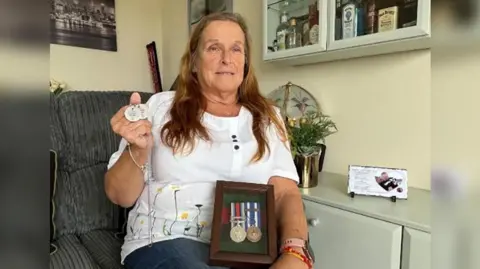 Kevin Shoesmith/BBC
Kevin Shoesmith/BBC
Saturday marks the 10th anniversary of the end of British combat operations in Afghanistan – a conflict in which 457 British servicemen and women were killed. BBC News spoke to the mother of Pte Gregg Stone, who was shot dead on a rescue mission in Helmand Province in June 2012.
Weep for yourself, my man
You’ll never be what is in your heart
Weep, little lion man
You’re not as brave as you were at the start.
“I had to fight back tears when I heard that song on the car radio yesterday,” says Angie Moore.
Her son Gregg Stone, 20, idolised Mumford & Sons, she explains. And the 2009 song, Little Lion Man, was a favourite.
Gregg’s big sister, Jennie, had booked tickets to see them in concert when he came home on leave from Helmand Province.
Neither sibling would see the band. Gregg would also never hold his daughter.
On 3 June 2012, Gregg, of 3rd Battalion The Yorkshire Regiment, was shot and killed attempting to free an Afghan policeman who had been kidnapped by Taliban fighters.
At the time of his death, his wife and childhood sweetheart, Samantha, was expecting their first child.

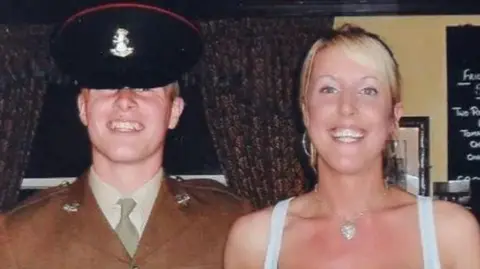 Angie Moore
Angie Moore
As the family tried to come to terms with the loss of Gregg, they endured further heartbreak when Jennie, 28, a mother-of-one, was killed in a car crash near Bridlington, in East Yorkshire, on 18 February 2013.
Ms Moore, 68, searches for words to capture the enormity of the loss.
“It was a nightmare to lose Gregg, but then to lose Jennie eight months after, it was… unbelievable,” she says.
“Every morning I used to wake up and think I’d dreamt it. Things would be different today. But things were never different. It was a nightmare and some days it still is.
“I still put this mask on. Some days it fits better than others. A record will come on and I’ll think of them.
“There’s all kind of triggers. Photographs. When I go places, I remember Jennie doing this, Gregg doing that. But luckily most of them are happy memories.”

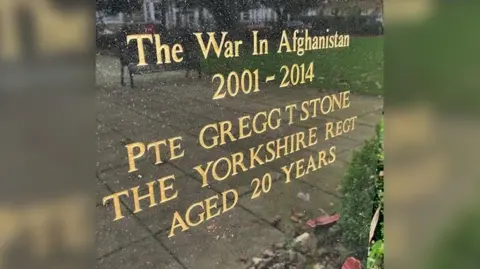 David Rimmington/BBC
David Rimmington/BBC
Ms Moore brought up Gregg, Jennie and her four other children in Atwick, near the East Yorkshire seaside town of Hornsea, where Gregg’s name is listed on the war memorial.
She feels Afghanistan is being forgotten.
“People don’t remember it,” says Ms Moore. “The world is forgetting.”
She now lives near Scarborough, but still has a view of the North Sea.
Outside is a bench dedicated to “Jennie Wren” – the family’s pet name for her daughter – where Ms Moore often sits to reflect and allow memories from happier times to return.
Indoors hang Pte Stone’s Army dog tags – the identification discs he was wearing when he died.
His Afghanistan medals and photographs sit on a cabinet, with a picture of a wren adorning a wall.
“Afghanistan changed us,” confesses Ms Moore. “We all became different people. Me especially. I became empty. Not whole. Like there’s a part of me missing.
“It caused rifts. Some of them have been mended, some of them haven’t. I suppose we like to blame it on other things but we all changed when we lost Gregg and Jennie.
“We’re a jigsaw and there will always be a part missing. It will never be complete.”

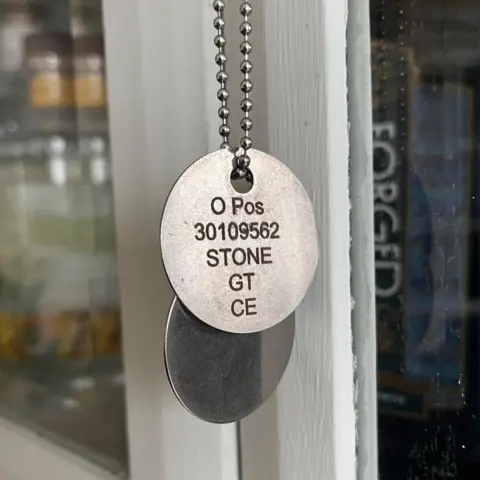 Kevin Shoesmith/BBC News
Kevin Shoesmith/BBC News
Ten years ago, when the end of British combat operations was announced, a BBC poll found 68% of respondents thought involvement was not worthwhile.
In August 2021, the Taliban regained control of the country after the US announced the final withdrawal of troops.
Ms Moore listens to those who criticised sending British troops to Afghanistan.
But she says: “Gregg emailed me from Shaparak [a checkpoint in Nahr-e Saraj].
“He said, ‘Mum, if anyone tells you we shouldn’t be here, take no notice.
“Gregg told me those people have a dreadful life. ‘We’re doing good’, he told me. That was from the horse’s mouth, so I won’t let anyone tell me we shouldn’t have been there.”

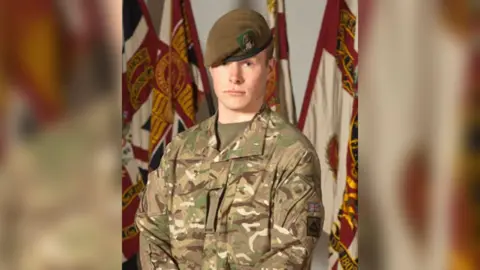 Ministry of Defence
Ministry of Defence
Ms Moore glances towards a clock on the wall, which displays a photograph of her son in uniform superimposed on to a union flag. It is the same image as the one that was issued at the time of his death.
“What hurts me is when people say it was a waste of time,” she says. “That’s like saying my son died for nothing, that it was a waste of time his life being taken from him.
“It wasn’t a waste of time. Maybe things have gone back and are not much better. But, for a time, they were. For a time, they made progress.
“My son’s life was not a waste at all. He knew what he was doing. He knew why he was there.”
The clock shows 11:00. Gregg is looking stern-faced.
“That really isn’t Gregg,” says Ms Moore, laughing. “It’s the only photo of Gregg I’ve seen where he isn’t smiling.”
It was the “death photo”, she explains.
“All soldiers, before deploying, had their pictures taken, in the event of their death.”

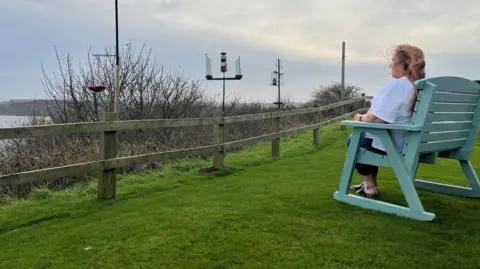 Kevin Shoesmith/BBC
Kevin Shoesmith/BBC
Ms Moore says her son was a “comic”.
“He was my laughing boy,” she says. “He smiled all the time. He joked about everything. He found fun in everything. He liked to entertain people. He was irritating.
“But he was a funny boy, very empathetic. Very mature in lots of ways. Very, very immature in many other ways. He was a good kid and he became a really nice man.”
And he would have been a great father, says his mother.
“Gregg was looking forward to becoming a dad. It was all he would talk about when he was out there [in Afghanistan]. He told everyone.”
Dealing with her loss has been difficult.
“You get through because you have to get through,” she says, looking out to sea.
“You don’t get a choice. You have to get through for the rest of your family, and for your own sanity.
“But you don’t have to let it define you. I don’t like to be known as Angie, the woman who lost two kids. I’m me. Yes, I did lose two kids, but I’m me.”
With Remembrance Day approaching, Ms Moore has a simple message: “Remember everybody, from every conflict, from every country – every son, every daughter, every husband, every wife. It’s not just about World War One and World War Two.”
Listen to highlights from Hull and East Yorkshire on BBC Sounds, watch the latest episode of Look North or tell us about a story you think we should be covering here.








